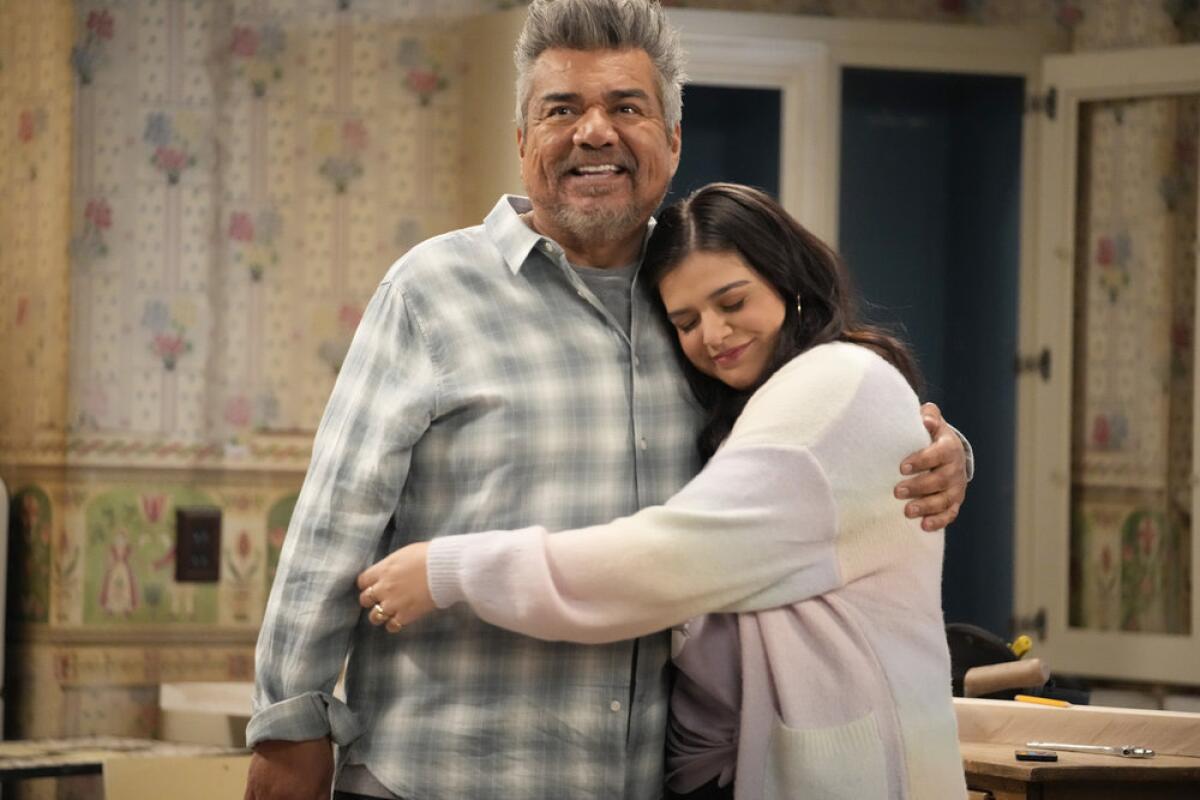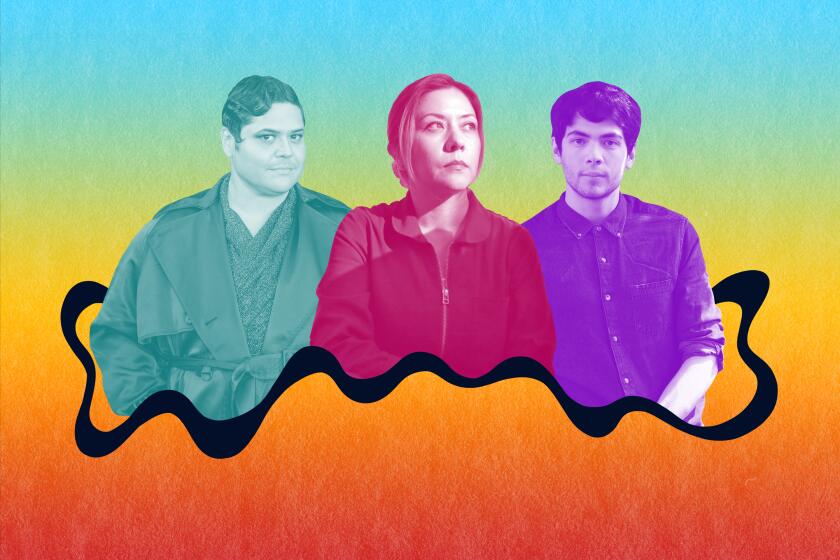George Lopez returns, once-estranged daughter in tow, with a textbook family sitcom

- Share via
In the ever-lengthening history of George Lopez sitcoms, the first time was a charm, the second and third not so much. The comedian’s much-loved “George Lopez” ran from 2002 to 2007 on ABC, followed by the deservedly short-lived “Saint George” on FX and the quite good, relatively modern “Lopez,” which lasted two seasons on TV Land. And now he’s back, for a potentially charmed fourth time, with “Lopez vs. Lopez,” premiering Friday on NBC, which returns him to network television and the multicamera, wacky family format of his first success.
Pilots are hard. They’re full of introductions and information, whereas the very point of the broadcast sitcom is returning you to a place where you already know everybody’s name. Such shows break in like shoes. The opening episode of “Lopez vs. Lopez” feels a little strained, especially given how hard the laugh track is working to convince you that the show is hilarious, a hit from get-go. But as one would expect, the second episode (of two available for review) is more relaxed, even as the hijinks are more hectic. It’s a decent, pro job — the sort of sitcom in which people say mildly offensive things without becoming actually offensive.
That “Lopez vs. Lopez” has a feature-ready real-world backstory does not make it any less a creature of the form. The series was co-created by Lopez and his formerly estranged daughter, Mayan Lopez, who costars as … his formerly estranged daughter. TikTok, where the Lopezes have posted together, had something to do with their reunion, and Mayan’s character — also called Mayan, as George is called George — also TikToks, if that’s the verb. (Third co-creator and showrunner Debby Wolfe, Salvadoran on her mother’s side, who discovered Mayan’s feed and thought she saw a show there, comes from the rebooted “One Day at a Time” and “The Conners”; Bruce Helford, who co-created “George Lopez,” is an executive producer and writer.)
Meet the inaugural LA Vanguardia class, talented Latinos defining the cultural landscape of L.A. and beyond.
Though George is the dad, he’s not the head of the household; it’s not even his house. Broke and homeless, he convinces Mayan to let him live with her — his moving business tanked in the pandemic and he sold his own home to keep paying his workers. Which is to say, though he is irascible and opinionated, cheated on his ex-wife, once left his daughter in a casino pool while he gambled inside and is rarely without a beer in his hand, he’s basically a good guy.
Here he is embedded in a commedia dell’arte ensemble of best friend Oscar (Al Madrigal), sassy co-worker Brookie (Laci Mosley), ex-wife Rosie (Selenis Leyva), daughter’s longtime partner Quinten (Matt Shively) and cute child Chance (Brice Gonzalez), with whom George shares a bunk bed. That the principals are Latino— except for Quinten, who is white and played as pointedly bland, and Mosley, who is Black — is rare for network television; you are not liable to hear a pun on the norteño band Los Tigres del Norte anywhere else on the broadcast majors. But, broadly speaking, the product is not without precedent. Indeed, it is highly precedented.
With his big shock of gray hair and not unattractively worn countenance, Lopez is nice to have around. If the character is an old dog who might still learn a few new tricks, the actor has got his tricks pretty much in line. (George teaches Mayan how to get mad — it’s “the Lopez Way” — and she teaches him that anxiety (which he dismisses as “not even a real thing — it’s like Dracula or, you know, global warming, peanut allergies”) is real.
Before beginning medication, Mayan explains, “I was in a constant state of fear and feeling unsafe.”
“That’s being brown in America,” George replies. “They don’t have a pill for that.”
A Times analysis has found that Latino representation in film and TV has stagnated for a decade-plus, even as Latinos’ share of the population has grown.
In her first major outing as an actress, Mayan Lopez acquits herself well. Madrigal, who just has to be funny, and is, plays a pothead so classic it elicits a Cheech & Chong reference. There are some mild sex jokes, which you can hardly avoid on a family comedy nowadays; a little bit of slapstick; insult humor that doesn’t kill the heartwarming vibe; a good portion of Kids These Days humor on the part of the older characters; and the oft-used yet not especially funny dodge of having old folks speak or act like young ones — George saying, “Stop being so extra” or twerking with Rosie. Also textbook is the exchange in which George tells Rosie that he was ashamed to tell Mayan he’d lost his house, “because I didn’t want her to lose respect for me,” and she responds lovingly, “Oh, honey, Mayan’s never respected you”; but Leyva, perhaps the most agile member of the cast, gives it life.
For all its discussion of trauma and therapy, its cultural representation and a few politically pointed jokes — all welcome in this non-niche context — the more immediate job of a series like this isn’t to put something new under the sun. It’s to draw the audience that actually watches network television. That would be progress.
‘Lopez vs. Lopez’
Where: NBC
When: Friday, 8 p.m.
Rating: TV-PG (may be unsuitable for young children)
More to Read
The complete guide to home viewing
Get Screen Gab for everything about the TV shows and streaming movies everyone’s talking about.
You may occasionally receive promotional content from the Los Angeles Times.








